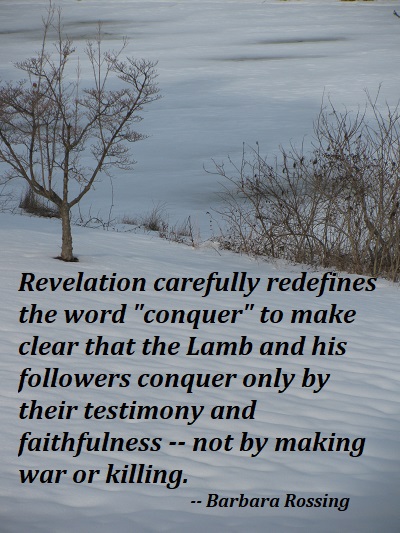
Revelation carefully redefines the word “conquer” to make clear that the Lamb and his followers conquer only by their testimony and faithfulness — not by making war or killing. War is something done against God’s people by evil beasts and by Rome, not something that God’s saints or the Lamb practice in this book. Two verses of Revelation do indeed refer to Jesus as “making war” — Revelation 2:16 and 19:11 — but the way he makes war is crucial. Jesus makes war not with a sword of battle but “by the sword of his mouth.” The word is Jesus’ only weapon — this is a reversal as unexpected as the substitution of a lamb for a lion. These reversals undercut violence by emphasizing Jesus’ testimony and the word of God….
Thus, the message of the book of Revelation becomes a reframing of the whole concept of victory, giving victory first to the Lamb and then to us. Nowhere in Revelation do God’s people “wage war.” What they do is “conquer” or “become victors” (the same word in Greek) — and they do that by the Lamb’s own blood and by their courageous testimony, not through Armageddon or war. In contrast to Rome’s theology that defined Victory as military conquest, Revelation develops a counter-theology of the nonviolent victory (nike) of Jesus, God’s slain Lamb, in which “evil is overcome by suffering love,” not by superior power.
— Barbara R. Rossing, The Rapture Exposed, p. 121-122
Photo: South Riding, Virginia 2/22/2015